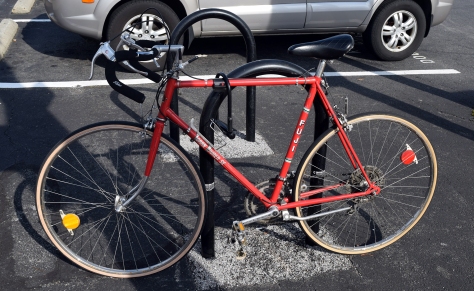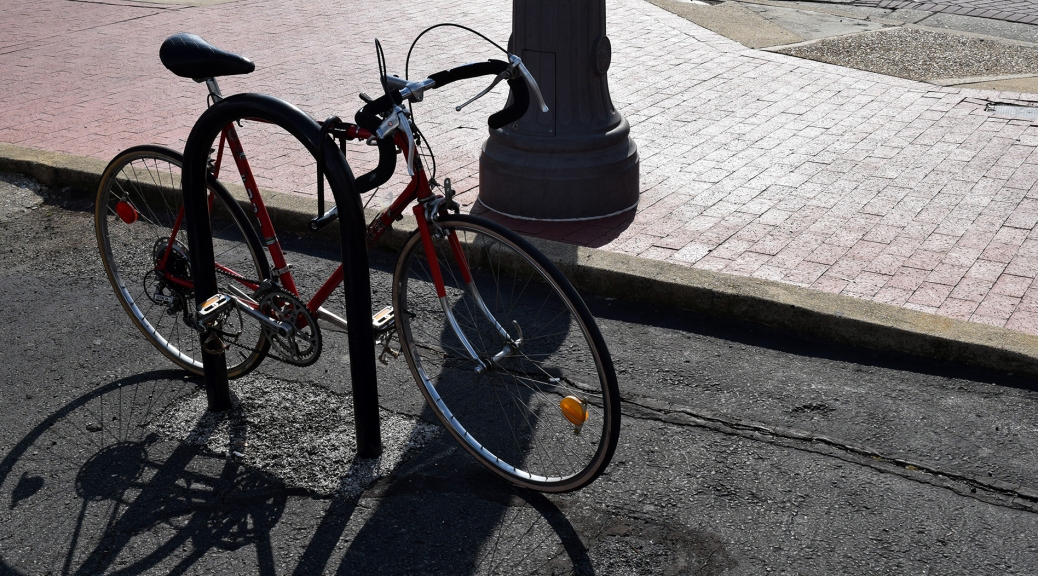The Shimano [shifter] also has thumbscrews for easy adjustment. Like the SunTour, it has plastic sleeves over its lever arms to make your grip on them more secure. Some think this is inelegant, but it works.
– “Two Wheel Travel, Bicycle Camping and Touring,” Peter Tobey, editor (Dell 1972)

Spotted an ancient Fuji bicycle this morning on the way to a haircut – I told them to cut only the gray ones and so emerged nearly bald – and paused to look it over. What a nice bike.
Motorcycles and bicycles have small styling cues that etch themselves in memory, place them in time and sometimes transport you.
Example: My first motorcycle, a really-used 1974 Honda CB750, had green-faced speedometer and tach dials. I can’t see one of those dials, on another bike or in an eBay photo, without thinking of that Honda.

But this Fuji is obviously someone’s commuter, nicely kept, and like the Raleigh I found in Coventry two years ago, it’s a genuine ghost from the past. I have a yellow Fuji S-10S, purchased during the Ford administration, and this orange Gran Tourer SE outside the barber shop is about as old1 with lots of identical components.

Circling around, probably making passersby wondering what the hell I’m doing, I see lots of memories:
- the two multi-colored stickers around the seat tube2
- wheel reflectors mounted 180 degrees opposite the Schrader valve stems (to balance out the wheel spin)3
- the brake’s safety levers, which were never considered very safe (since they couldn’t impart enough gripping force, they used to say)4
- the aluminum disc spoke guard behind the freewheel5
- the rat-trap pedals with toe clips and straps
- the Nitto Olympiad handlebars

And there are others, the chrome front forks and quick-release lever and gumwall tires and Fuji-badged SunTour components. The “Fuji Vx” rear derailleur is really a SunTour device and I’ve mourned the loss of SunTour since forever.

The derailleur shift levers are mounted on the handlebar stem6 and they have the classic plastic sleeves that make me think of the line Some think this is inelegant but it works in “Two Wheel Travel: Bicycle Camping and Touring,” a 1972 book that was my bible for a time.

But it’s the Dia-Compe centerpull brakes that almost have me laughing out loud because they make me remember a long-ago visit to Broadway Cycle, a long-gone bike shop in Cleveland.
It was a genuine bike shop, rather dark and not very wide but deep, with a variety of bikes at different price levels. It was run by two guys who knew their stuff and liked their work. I bought my first 10-speed there, a silver AMF Roadmaster that served me well.
Anyway, some friends (Tom McCray and Eric Blemaster among them) and I had bicycled out there to get parts or tools or some such and we were jonesing over new bikes we couldn’t afford. For some reason, I asked one of the shop guys about brakes.

“Are those brakes Dia-Compe?” I asked, pronouncing it dee-a-com-pay which I thought made me sound like a cognoscenti.
“You mean die-comp?” the guy said, not missing a beat, and my friends burst into laughter and dee-a-com-pay became part of our lexicon, our language, our legend, something we would joke about decades later.
I was half-tempted to find the Fuji’s owner and congratulate him or her for keeping it on the road. But one doesn’t do such things, of course. And I probably wouldn’t have resisted the temptation to ask about the dee-a-com-pay brakes.
1 – Circa 1980 or 1981, near as I can tell.
2 – My Fuji lost the bottom one years ago. The other remains by the grace of Scotch tape.
3 – I removed my wheel reflectors because they just weren’t considered cool.
4 – Ditto for the safety levers.
5 – And for the spoke guard. “It’s just extra weight,” the bicycle magazines used to say, and its absence forces you to pay attention to the rear derailleur’s adjustment, or risk sending your chain into your spokes on an ill-advised shift.
6 – Mine came mounted on the downtube, which I really like. It makes you get more involved with the bike while shifting, or something.


Dee-a-com-pay? They’re down in Engineering.
(Make sure you bend yet knees,eh?)
“Where?”
Happy to be here!
You know, I am so glad I was able to take that ore boat trip with you. It was perfect.